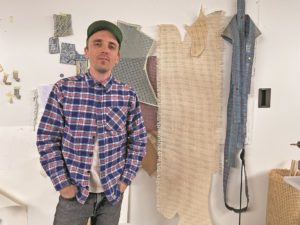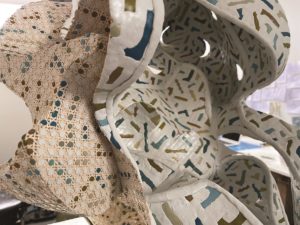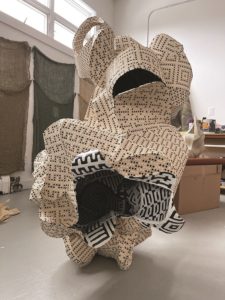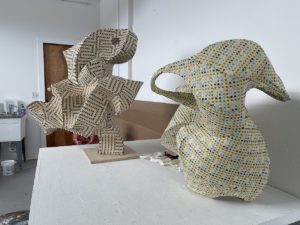Austin Ballard creates undulating forms of rattan and clay that writhe and roll like kelp. The sculptures, which take weeks, and sometimes months, to complete, feel almost figurative; whether they depict animal, vegetable, or alien is debatable. But their decorative impulse keeps them inviting and knowingly humorous.

With his residency at the Provincetown’s Fine Arts Work Center drawing to a close, Ballard reveals the fruits of his labor in a show at the Hudson D. Walker Gallery opening Friday, April 8.
The 35-year-old North Carolina native moved to the northeast 12 years ago after completing a B.F.A. in textiles and fibers at the University of North Carolina at Charlotte. He earned an M.F.A. in ceramics from the Rhode Island School of Design in 2012.
Ballard’s training immersed him in woodworking, welding, ceramics, and textiles. “I like working with my hands,” he says. “I like creating objects that are surprising to me, so I can learn something of myself. For me, the material is important to making that leap, and in this work,” he says, gesturing to the sculptures populating his studio, “that material is woven cane webbing, which is used heavily in North Carolina in rattan furniture.”
Ballard’s work exists at the crossroads of fine art and craft. “The work is a hybrid,” he says. “It steps toes into both worlds, and I think that’s what keeps me interested.

“In North Carolina, textile mills and furniture making have a heavy tradition,” he continues. “We didn’t have modern art museums — they were craft museums. That’s how I started thinking about craft as more than purely utilitarian objects — thinking about them aesthetically, creatively, conceptually.”
Ballard gives his materials a second life. “I’m resourcing this dying industry in North Carolina and trying to bring new eyes to it, but at the same time not wanting to be limited by the capital ‘C’ of craft,” he says.
Ballard says his time at FAWC has opened up his work — literally. “I’m interested in what happens when the forms become less like bodies and more like shells,” he says. “In one iteration it is a contorted body, but leaving it open it’s now a vessel that’s falling apart, collapsing. You have to kneel down and look inside. It becomes cavernous, like walking into a church or basilica. It is both architectural and bodily. It’s a micro-macro thing.”

Ballard’s Irish Catholic upbringing influenced his process. “The ritual practice is a significant part of my work,” he says. “I think that’s also why the work leans towards these simulacra of augmented scholar’s rocks or talismans. They’re objects of a spiritual nature, but there’s also a wink to something like a designer handbag. It’s this consumerist idea of functionality and utilitarianism that, as an American, I was raised with.”
Ballard’s sculptures are created from flat forms, much like making clothes from patterns. “I’m very interested in the materiality and tactility of ritual, and what it does to non-physical aspects of our lives — whether that be mental anguish, anxiety, stress, relief, a sense of ease.”
But there has to be an element of surprise because, Ballard says, “I get bored quickly.” The largest piece in his studio took him four months to construct. “There are no sketches involved, no preplanning, everything is intuitively built,” he says. “I don’t make what I know, I know by making.

“It’s just the same process, over and over again,” continues Ballard. “There’s something really visceral about that — putting yourself in a room to make this thing without knowing what it will be, just trusting the process. I think that level of trust is really exciting. It’s scary, it’s anxiety inducing, but I’m more interested in what that says about the object when it’s done.”
In our instantaneous, Google-able world, says Ballard, “We’re so quick to have a result. Everything is immediate. But there’s something courageous and honorable about taking time, slowing down, and just giving yourself up to something.”
Something Rattan
The event: A show of works by Austin Ballard
The time: By appointment; Friday, April 8 through Tuesday, April 12
The place: Hudson D. Walker Gallery, Fine Arts Work Center, 24 Pearl St., Provincetown
The cost: Free



